Text
Reasons Causing the Growth of Logistics Service in India
A well-organised logistics is an essential part that ensures the smooth functioning of the end-to-end supply chain possible. An efficient logistics system contributes to achieving timely deliverables to keep your customers happy. Improvement of infrastructure and freight corridors is the responsibility of the governing authority in the country. In India, the demand is for more integrated end-to-end logistics solutions that comprises integrated infrastructure, services platforms, and digital platforms. With the Indian government keen on improving the logistics industry as it is one of the key sectors of the Indian economy, we can see an immense growth of the logistics service in India.
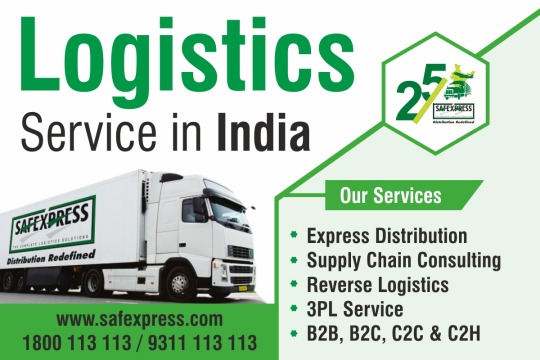
The Indian government has increased the infrastructure spending significantly with a focus on new economic corridors, improved road, railway infrastructure, and a push towards digitalisation making it beneficial for the best logistics company in India to take advantage of these measures for their growth.
Safexpress, a leading logistics service in India provides value-added logistics services for 9 different business verticals providing a multi-modal network to reach PAN-India. With its state-of-the-art technology-equipped warehouses and facilities, Safexpress provides solutions catered to a vast variety of industries.
Few reasons for the growth of logistics in India are:
1. Increased Investment For Dedicated Freight Corridors And Infrastructure
The increased spending on infrastructure, focus on new and improved economic corridors, and road and railway infrastructure is with the goal of bringing down the logistic costs. The government has started investing the funds through the Bharatmala Pariyojana project to construct more than 13,000 km of roads, additional investment for national highway projects, and national highway corridors to further boost the logistics and transportation industry. The government aims to commission eastern and western dedicated freight corridors (DFC) by June 2022 and build three new DFCs. These DFCs will decongest the highly saturated road networks in the country, facilitate speedier freight transportation and help in reducing logistics costs.
As road and rail connectivity is an indispensable factor of economic development, and with railways commissioning eastern and western dedicated freight corridors, this will help in bringing down the logistics cost. This will also ensure smooth connectivity between different parts of the country and provide easy and faster freight movement.
2. Emphasis On Digitisation
Technology has played an important role in solving logistic hurdles like last-mile logistics, best route optimization leading to better supply chain management. With the Internet of Things (IoT), automation technology, blockchain technology, big data analysis, artificial intelligence (AI), and robotics being used by the best logistics company in India to provide end-to-end logistics solutions, enhanced quality and service with reduced cost and less human error can be achieved. With the introduction of digital payment facilities interaction with the customer is fast and secure.
3. Sustainability, green energy
The Indian government’s intent to increase the share of green energy in the national energy grid and transition to a zero-carbon fuel regime is in line with its steadfast commitment to sustainability. With the government targeting for a 100 percent electrification of broad-gauge railways to be achieved by 2023, thus reducing the dependence on conventional fuels. As more emphasis is given to electric vehicle adoption, usage of eco-friendly packaging, adoption of methods to generate lesser carbon print, sustainability has become a key mantra for all in the logistics industry.
The Indian logistics market is expected to reach about USD 255 billion in 2022, growing at a CAGR of 10.5 per cent. With the various initiatives and policy changes implemented by the government, it is an opportunity for the best logistics company in India to grow.
Source: https://www.reddit.com/user/safexpress1/comments/qbuh3x/reasons_causing_the_growth_of_logistics_service/
0 notes
Text
5 Capabilities Required by Ecommerce Logistics Company in India
Ecommerce logistics service mainly depends on the speed of packaging, shipping, and delivery of the order as fast as possible. In ecommerce logistics, real-time traceability has become a necessity to meet the needs of consumers and to solve possible problems of delivery or loss of packages. E-commerce logistics are critical to success as the consumer always has another option to shop from. With the added pressure of shorter deliverables and returns, ecommerce logistics have become more challenging.
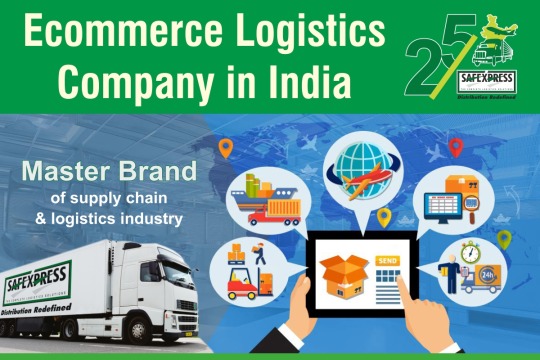
Businesses need an efficient ecommerce logistics supply chain to meet the demand, and many businesses simply do not have the resources to deal with many of the logistics issues that are related to ecommerce. Ecommerce businesses need to consider whether or not to outsource their e-commerce logistics. Outsourcing services to an ecommerce logistics company in India will give businesses added advantages like technology, manpower, expertise, and access to a larger geographical area for marketing their products. Before selecting a partner to outsource your ecommerce logistics, you need to check whether they can fulfil critical ecommerce logistics.
Some of the ecommerce logistics capabilities that are critical are:
1. Inventory localisation to reduce cost
In today’s market, the requirement of shorter shipping cycles and delivery time windows has made it prudent to keep your inventory in various warehouses that are closer to your consumer base to reduce delivery times. Services that can provide local distribution options are often cheaper and help keep costs low. Implementing a regionalised inventory opens up the possibility of using regional carriers, and other delivery options that are not possible over longer distances.
Safexpress, a market leader in supply chain and logistics, offers solutions from warehousing to timely distribution of goods across PAN-India. Safexpress B2C specializes in Ecommerce logistics and supply chain management offering strong, tech-enabled, real-time data capturing solutions to facilitate time-sensitive, hassle-free, safe warehousing and inter-modal express distribution ensuring shorter shipping distance and efficient service.
2. Usage of big data through smart analytics
Data has become an integral part to identify demand patterns and trends of consumers, enabling the business to anticipate the needs of their consumers and make necessary changes to their processes. With the help of technology, real-time data analytics is possible for better decision-making. These technologies integrate machine learning and AI-based solutions for route navigation, driver allotment, and much more which enables businesses to save on total operational costs, reduce deliver time and improve on last-mile logistics.
3. Automation
Automation, especially in ecommerce logistics ensures to maintain your promised deliverables to your consumers. Automated systems help to notify consumers when delays occur along the supply chain. The usage of robots, automated delivery trucks, and drones is expected to make automation commonplace in the near future. Although automation requires a major investment, it increases efficiency and ensures the long-term return of investment for ecommerce businesses.
4. Managing returns
Sometimes consumers are unhappy with a purchase and want to return or exchange them, a process also known as reverse logistics. The costs and the process for handling reverse logistics need to be considered while sourcing for a logistics partner. The lack of proper product-return processes would lead to consumer and revenue loss.
5. Last mile
The last mile is the stage in the delivery process when the package travels the last part of the journey to the consumer’s door. It is challenging due to traffic and narrow lanes in urban areas. Late delivery due to last-mile inefficiency will create a negative impression on the consumer.
Ecommerce logistics company in India needs to develop strong e-commerce logistics using technology for e-commerce businesses.
0 notes
Text
Advantages of Using Air Cargo Services in India
Air Cargo or air freight is the most expensive form of transport involving the transportation of cargo by air. It is the fastest way to transport cargo. It is often used for high-value and low-volume shipments. Air cargo is shipped through the same gateway as a passenger or commercial airline. The demand for air cargo services in India has increased significantly over the last few years, due to globalization, just-in-time manufacturing, inventory control methods, and the growing requirement of industries of all types for rapid delivery.
Types of Air Cargo
Air cargo can be classified as general and special cargo.
General cargo
This type of cargo mainly includes premium goods that are fragile in nature such as electronics, jewellery, and pharmaceuticals. Air cargo is more expensive than shipping by sea or road, but due to the high margins that comes with the sale of these products air cargo is the most apt form of transport.
Special cargo
This type of cargo requires special temperature-controlled conditions and needs to be handled with care for transporting fall into this category.
Some of the cargo types that fall under the special cargo category are:
Temperature Controlled: Cargo that requires being stored under a certain temperature due to the special nature of the cargo like fruits, vegetables, medicines.
Hazardous Cargo: Cargoes that are flammable, poisonous, radioactive, explosive are some of the types of cargoes that come under this category. This cargo should be packed properly and loaded in a certain space allocated in the airplane to avoid accidents.
Livestock: This type of cargo involves shipping of live animals requiring a properly ventilated area and should be placed in suitable carriers that allow their comfortable stay during the flight.
Human Remains, Tissues, and Organs: Transportation of this type of cargo involves special handling, packaging, and temperature control.
Advantages of Air Cargo
· Saves Time
Transporting with air freight saves time as it is much faster than shipping, rail, or road transport.
Safexpress is a leading logistics company that provides an efficient and reliable air freight service through its Safe Air network. This air service combined with surface logistics offers optimal multimodal solutions and faster deliveries. Safexpress has a door-to-door pickup and delivery service that is backed by 54 state-of-the-art air hubs managed by a dedicated team of specialized air freight experts 24x7. Easy handling of various documentation formalities required for different product categories ensures prioritized and cost-effective movement of cargo.
· Reliable service
Air cargo has reliable arrival and departure times with very few delays, and even missing a flight would not cause much delay as there are usually flights departing every hour.
· Low insurance premium
As the time travel time of the cargo is very short, insurance premiums on air freight are generally lower.
· High level of security
The airport safety controls over cargo are tightly managed and also reduces the chance of cargo being stolen or damaged.
· Less warehousing requirements
The clearance time for air freight is fast thus avoiding the need for local warehousing. Customs clearance, cargo inspection, and cargo handlers are more efficient and the cargo is cleared within a matter of hours.
· Less packaging is required
Air shipments require less heavy packing when compared to other modes of cargo transportation. This allows you to save both time and money in providing additional packing.
· Real-time updates of cargo
Not just one air cargo company in India, but many of them provide services through which you can keep track of your cargo, keeping you updated on the status of your cargo from departure to arrival.
0 notes
Text
5 Benefits of Using a 3PL Company in India
Increasing global trade, ecommerce, shorter deliverables has made the traditional business model of handling many or all operations in-house not very productive. Third-party logistics, also known as 3PL, is a system where a third party provides logistics services to businesses in need of inventory management and distribution. A 3PL can perform parts or all logistics-related activities for the client some of which include inventory storage, inventory management, freight forwarding, shipping, distribution, customs clearance and declaration, packaging, warehousing, and many more such activities. Outsourcing to a 3PL company in India would allow businesses to focus on marketing, growth, and customer satisfaction.
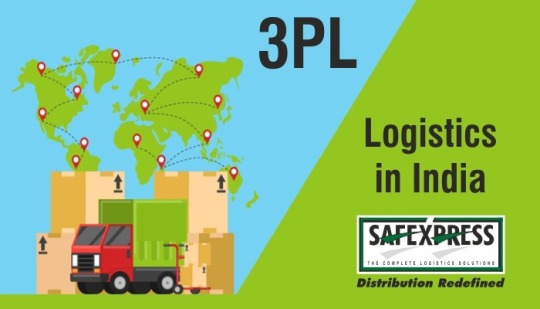
There are many benefits to outsourcing fulfilment to a third party logistics company in India as they offer solutions that ultimately provide reliable logistics and help to maximise profitability for a business.
5 key benefits of using 3PL services are:
· Reduce Costs and Saves Time
As businesses grow, fulfilling orders become expensive as it requires warehouse space, machinery to handle lifting services, investment in technology, manpower, and insurance. Using 3PL logistics firms is helpful as they already have an extensive network to handle logistics thus reducing your overhead costs. By partnering with a 3PL company in India you can avoid making huge infrastructure investments as it can provide transportation, warehouse space, manpower, software support, and tracking technology, among other things. Working with a 3PL gives you time to focus on more strategic initiatives, such as product development and marketing.
· Leverage Industry Expertise and Experience
A business does not need to be well-versed in every detail of shipping and logistics. By outsourcing to a 3PL service provider they will have the knowledge and experience in matters such as transport documentation, import and export, international compliance and economic regulations, etc. They would be knowledgeable and up-to-date with the latest industry trends and complexities. It would be an ideal opportunity for businesses looking to expand into new markets as they can benefit from the logistics support provided by the 3PL service provider. It would help to reduce costly delays, cutting down the cycle time, and making entry into a new market smooth and easy.
Safexpress, one of the largest and fastest logistics company, is an established 3PL logistics and inventory management provider in India. With their intensive usage of technology and adherence to standards, they are the best in the industry to handle your logistic requirements. Safexpress, with its well-established country-wide network all over India, safe warehousing, and inter-modal express distribution services, would be an ideal 3PL logistics provider for your business.
· Focus on Core Competencies
Outsourcing logistics will give your businesses time to focus on its core competencies and thus reducing strain on the business. 3PL service providers have the technical resources and partner network that can include marketing agencies, custom packaging providers, and more allowing the improvement in the efficiency of the supply chain.
· Gain Flexibility and Scalability
3PL service providers are the ideal solution for business that needs to scale their supply operations depending on market demand without investing in additional infrastructure. The flexibility to increase or decrease your inventory depending on demands ensures that the supply and distribution of your products remain constant as per current business needs.
· Improve Customer Satisfaction
3PL services provider would help to provide improved services and response time, timely deliveries, and greater brand reliability. This translates to satisfied customers and ensures brand loyalty.
Businesses can partner with a third party logistics company in India to scale their business leveraging upon the expertise of a 3PL company to handle all logistics.
0 notes
Text
6 Key Skills Required by Logistics Consultants in India
Logistic consultants help businesses to optimise their supply chains to run smoothly using solutions that provide use of people, equipment, and technology. They are independent in their functioning hence can provide an unbiased review of your supply chain issues and provide suggestions for better performance. Logistics consultants in India scrutinize the current supply chain for any inefficiency in inventory, vendor management, coordination with different departments, or the transportation section using various benchmarks to check the working of a supply chain and offer recommendations accordingly.
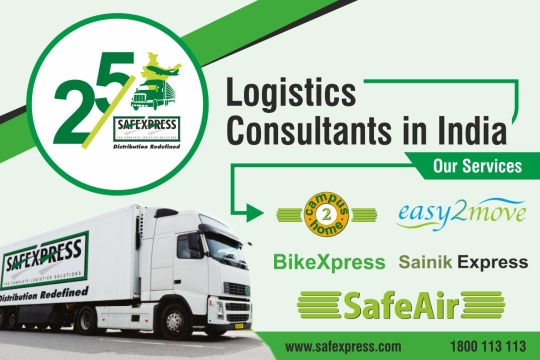
By using consultants from a logistics company in India, businesses can save time, cost and improve the overall business. They are specialised in conducting research and analysis to develop strategies for deriving optimal services from your business. A logistics consultant would be able to create and recommend business plans that are based on your business policies and regulations.
6 key qualities that a logistics consultant should have include:
1. Subject Matter Knowledge
Although the process of analyzing a business’ supply chain capabilities are more or less the same across various industries, knowing your business domain would be an added advantage. They would be able to provide accurate predictions and outcomes of actions made anywhere in the entire supply chain. They should be equipped with the latest trends and technology used in the supply chain to be effective.
Safexpress, a leading logistics company in India, has helped companies to create and manage high-performing, flexible supply chains that provide sustained, profitable growth. Safexpress offers specialized consulting services tailored to the needs of clients enabling them to have a competitive edge in the market. At Safexpress, you are led by 3,000+ highly experienced professionals seasoned in industry, process, and subject matter to help clients achieve efficiency objectives.
2. Keen Attention to Detail
The supply chain consists of numerous components and even the smallest detail missed out would create a huge loss for the business. A logistics consultant needs to be organized and pay attention to even the smallest of details to keep the supply chain as efficient and fast as possible.
3. Information Technology Knowledge
In today’s world of logistics, usage of the latest technology makes a great difference not only for yourself but also for your customers. The logistics consultant should be well-versed with the technology tools, like warehouse management or analytics tools to analyse and adopt the same for your business.
4. Ability to Adapt
In an ideal world, a well-planned logistics system would ensure smooth functioning of your supply chain but unexpected things do happen and you need to adapt quickly and fast to maintain a smooth flow of goods. Problems and last-minute glitches are inevitable in logistics so consultants need to be able to quickly shift to backup plans and make the necessary adjustments.
5. Accountability
A good logistics consultant needs to take responsibility for any mistakes caused if things do not go as planned. If a problem arises find possible solutions you can use, just in case it happens again in the future.
6. Good Interpersonal Skills
Logistics requires interaction with different people from workers, vendors, senior management, and clients. There needs to be clear communication between all parties involved to prevent mistakes from happening. Both in the face-to-face and written form of communication clear and effective imparting of information is essential.
A logistics company in India would be able to provide the right mix of planning, technical expertise, and specialized tools to ensure that your supply chain reaches its full potential.
1 note
·
View note
Text
Logistics Consultants in Need of a Paradigm Shift
As the world began to make sense of the pandemic early last year, the US in particular was confronted with shortage of a very peculiar kind - toilet papers. With lockdown progressively imposed, people resorted to panic buying and suddenly, there was a scarcity across the country. So, while there was office rolls glut, toilet papers flew off the shelves. The US though manufactures more than 90% of toilet papers it needs with China and India sufficing for the balance; it was a horrible situation to be in. Back home, India was confronted with the lack of quality sanitizers and face masks. The scarcity in supply manifested itself in several other consumables and healthcare products and by the end of the year, oxygen concentrators; Remdesivir, Favipiravir, etc. not to be found when needed. What is the point when a lifesaving drug is not available when needed the most was the understandable refrain. From cycles to medicines to lifesaving drugs, we were staring at a supply shock. The very same consultants and experts who produce study papers after papers appreciating from technology to robotics, do advocate the need to understand the value chain better? So, how would a supply chain or logistics consultant worth her salt would provide for the solution for the disequilibrium between supply and demand the world found it in?
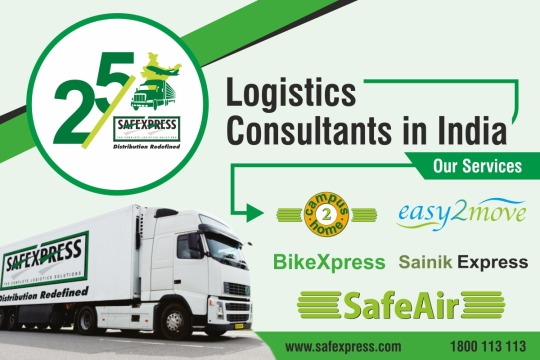
A general tendency that consultants or consultancy firms suffer from lie in their idea to quantify everything. Even before the Covid-19 stuck, this quantification had to factor in tariff barriers, trade restrictions, anti-dumping to hurricanes, heatwaves, typhoons, tsunami, etc., but apparently were taken as bolt from the blue, thus neutralizing any serious enquiry about the severability or threat such socio-economic disruptions have been posing to the entire value chain to which supply chain or logistics is just a bearer.
A value chain takes the perspective all the way from where materials are mined, the metals that are created, how they pass through the system, and then finally how the finished good gets to the customer. So a supply chain will be defined by a company, and it might include their first tier of suppliers. It might even include the suppliers of those suppliers. But very rarely do companies think of their supply chain as going all the way back to where do the raw materials come from and how do they come together at each step. How does a consultant, primarily a supply chain & logistics consultant hired by a company into manufacturing or logistics go into enquiring the whole value chain and suggest measures for strengthening and adaptability and at the same time enhancing efficiency and profit?
Over the last 3 decades or so, world has created for itself a multiplicity of economic systems competing with each other assisted by an incredibly complicated, complex global supply chain designed to serve the value chain. And they were designed for cost and efficiency, but without really a thought to what could go wrong along the way. The very same consultants and experts who produce study papers after papers extolling technology and robotics, do advocate the need to understand the value chain better?
Just In Time remains one of the incredibly successful story of a very lean supply chain that business houses of every hue adopted in different measures. Its’ original proponent Toyota, though remained largely unaffected by the pandemic. Contrarily, businesses including automotive who increasingly got into the same shoes forgetting that one size may not fit all and when the time came, they were helpless bystanders. When I urgently need something today, I’d rather not want to know where it is manufactured. Be it essential life-saving drugs or touchscreen of my hand phone.
Whether consultants, Logistics consultancy firms and specialists engaged in devising post-pandemic logistics strategy would have a rethink; curtail Just In Time, focus on localized warehousing, storage, and invest in regional logistics structures or would they remain steadfast in profit-seeking, efficiency-looking organisms making incremental changes here and there? Time!
0 notes
Text
Where is Air Cargo Operations Headed to?
A Working Group Report by Ministry of Civil Aviation, published in 2012, says, “Evidence between 2007 and 2010 Logistics Performance Index (LPI) indicates that countries at the same level of Per Capita Income, those with the best logistics performance experience an additional growth of 1% in GDP and 2% in trade.” Similarly, according to International Civil Aviation Organization (ICAO), the output and employment multiplier of the aviation sector are 3.25 and 6.1 respectively. This means every Rs. 100 spent in the sector results in an addition of Rs. 325 in GDP and every 100 direct jobs created in the sector results in 610 jobs created in the larger economy. This GDP-air cargo relation is amply justified by the data available for the period between 1995 & 2010.
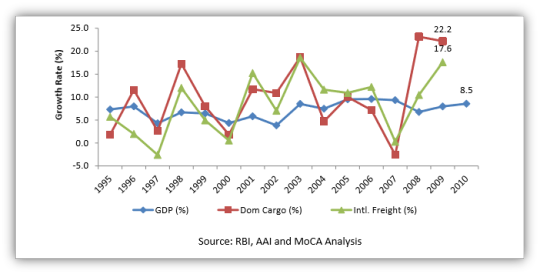
Unfortunately, no such study report is available for the period afterwards. The annual performance report put up by the Ministry of Civil Aviation clearly shows an overall stagnation between FY11-12 & 15-16 with growth thereafter only marginal. The immediate reason for this lull can be attributed to the global financial crisis that affected the incoming cargo with domestic cargo businesses of pharma & ecommerce sector rescued it from the tumble. In fact, health of India’s air cargo sector can be gauged from the fact that while the country’s total trade has risen by 22.4% between FY11-12 & 15-16; its total air cargo traffic has actually fallen by 3%. And if seen in terms of GDP which has been contracting quarter after quarter, the slump in the tonnage as well as the number of people directly and indirectly employed could be well understood.
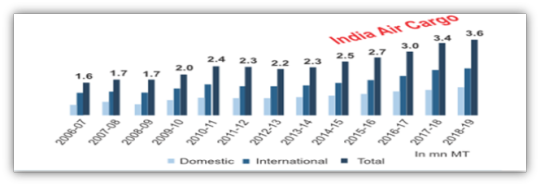
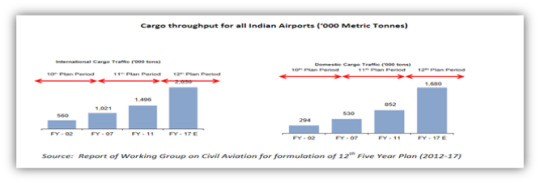
The Government of India adopted Air Cargo Open Sky Policy in 1992 which allowed all domestic and foreign carriers that met operational and safety requirements to operate to scheduled and non-scheduled cargo services to & from any airport in India that had custom facilities. In addition, a regulatory regime for cargo rate was abolished and carriers were allowed to fix their tariff. The opening up of the sector saw a spike in international cargo traffic, primarily due to a rise in scheduled services by foreign airlines as carriers like Lufthansa, Air France and KLM doubled their capacity in the country. The effect was cascading as a host of domestic players entered into the business. Despite existing infrastructure bottlenecks, there was an impressive growth that promised a rosier picture. An industry that is positively correlated with GDP growth and employment generation has gone into stagnation for most of the last decade should be worrisome. But what exactly has caused this slowdown?
The Working Group’s study paper cited above pointed out thus, “A peculiar aspect of India’s trade is that despite the country’s massive deficits in value terms, when it comes to volumes, outbound traffic is, at times, much higher than that of inbound traffic! And this shows in the composition of the country’s air cargo traffic as well. For example, the mentioned Working Group Report reveals that in FY2011, while the volume of inbound air cargo traffic was 6.6 lakh MT, the same for outbound traffic was 8.4 lakh MT. Such imbalances mess up an airlines’ ability to provide competitive quotes because many-a-time, their aircrafts are forced to fly empty. And while this has been a perennial issue with India’s air cargo sector, factors like volatile ATF prices and high taxes at airports, lack of warehouses and cold storage facility, cargo terminals, etc. have also played a significant role in ruining the prospects of India’s air cargo sector.”
Air cargo operation comes associated with time-centricity and urgency. Players who operate in delivery operations often perform far better than passenger-centric commercial airlines. Globally, DHL, UPS, Fedex & others fly their own cargo planes and also some dedicated premium routes in India. Domestic players though operate in multi-model belittling the feel of urgency or glamour.
The Expert Group nonetheless made an impressive forecast for air cargo believing that with businesses finding Just In Time model compelling & highly rewarding one coupled with forecasted exponential growth in online retail would the driving force. Meanwhile, the forecast was made in 2010-11!
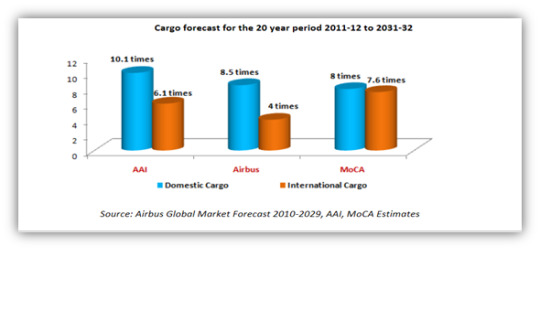
0 notes
Text
‘Just In Time’ Ran Itself Out?
“It’s sort of like supply chain run amok…In a race to get to the lowest cost, I have concentrated my risk. We are at the logical conclusion of all that” said Willy C. Shih, an international trade expert at Harvard Business School as mentioned in a recent piece published by the New York Times (How the World Ran Out of Everything; Peter S. Brookman & Chokshi). Willy was referring to the tumultuous events from the past year when the pandemic struck rendering the world into dark. There was a chaos on the seas and highways were desolate, with every soul confined to the dark uncertainty of time. In the making was a supply crunch.
Brookman & Chokshi recounts the story of Toyota, the Japanese auto-giant which pioneered the so-called Just In Time manufacturing in which parts & spares were delivered to the factories just as they need them allowing factories & manufacturers pairing production with demand with the burden of warehousing offloaded. This allowed major retailers to manage with a thin inventory and use more of their space to display a wider array of goods, and at the same time enabling manufacturers to customize their wares. Leaner production has significantly cut costs while allowing companies to pivot quickly to new products. This soon became a fad for businesses across board, from automotive to FMCG to RMG to pharmaceuticals. It has helped develop global supply chain lanes and domestic logistics networks. From manufacturer to retailer to the supply chain & logistics partner, it was a “happy all” scenario. Is this so? In March this year, a gigantic vessel remained lodged in the Suez Canal for a week closing the primary route between Europe and Asia cutting supplies to many countries including India, leaving no one “happy at all.”
Willy C. Shih specifically used two enlightening phrases; ‘race to get to the lowest cost’ and ‘concentrated risk’ to describe the thrall the businesses have gone into. Deng Xiaoping in 1978 gave the wings to Just In Time and businesses drove in hoards to invest transforming China into manufacturer of the world. Slowly much of South East Asia and India was producing inventory but at the same time were dependent on the other manufacturers for the raw material or spares. Input cost, specialization and technology in different ratios drove the show. This global arrangement soon manifested within nationalities like India where some states became producers whilst other consumers. Taxation system was worked out to complement the arrangement. In order to get to the lowest cost, businesses have gone too far in concentrating manufacturing across the globe and within the countries. Connected end-to-end, the supply chain and logistics helped sustain the balance until the applecart was disturbed.
Proliferation of logistics & distribution companies in India has come in spurts coinciding two major events; opening up of economy in 1990s and then the advent of online retail around 2010 as the next big thing. Structurally strengthened over time, logistics companies are now more formalized, more in sync with manufacturing activity. Naturally, more than 90% of all the investment in warehousing & logistics in the last decade have been restricted to top 8 cities. This is the same global pattern of concentration Willy C. Shih has talked about and as a recent report (JLL Capital Market Update Q2, 2021) points out, the warehousing sector saw a 15% fall in new supply YOY during the January-March 2020 amid subdued occupier leasing and investment activity. The contraction was 30% in case of absorption.
Clearly, this is unsustainable and experts for decades have warned about the consequences of over reliance on this business model. The solution lies in more regionalization, more decentralized production and closely-knit business-logistics ecosystem operating in concentric circles. Sceptics would say consumers don’t pay for resilience if not faced with a crisis. What would the businesses do? Buzz is that efficient supply chain & logistics is the calling.
Source:https://logisticscompany54182805.wordpress.com/2021/08/10/just-in-time-ran-itself-out/
0 notes
Text
Logistics refers to the overall process of managing how resources are acquired, stored, and transported to their final destination. For businesses that are expanding their operations or do not have the required infrastructure to handle the identifying of prospective distributors and suppliers, hiring logistic consultants would be the best option. A logistics consultant works closely with clients to evaluate their supply chain and identify areas where it can be improved. The continued growth of e-commerce has increased the need for logistics experts in India. Logistics consultants in India would help companies to improve their supply chain efficiency, reduce costs, and use these benefits to improve customer relationships.
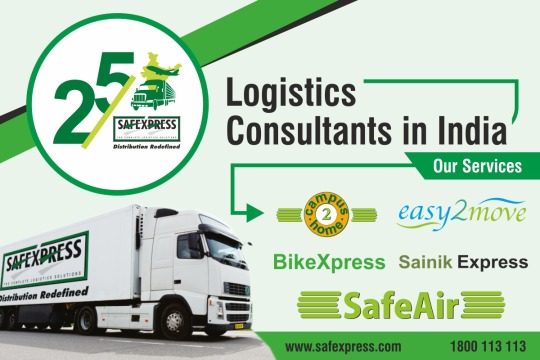
What makes a good logistic consultant?
Top logistics company in India has logistics consultants on their payroll who are individuals with broad supply chain expertise and industry knowledge. They are responsible for coordinating and directing distribution, transportation, and warehouse activities for a company, manufacturer, or its clients. When considering hiring a good logistic consultant few qualities to look for are:
· Proven Project Management Record
Logistic consultants handle a lot of cross-functional work, as the supply chain is made up of many different departments. A good logistic consultant will be able to see the big picture instead of bending to meet internal demands from various departments. A good consultant should have a good track record and should be able to prove it. A logistic consultant is someone who has experience in fulfilling budget goals set by the client, meeting deadlines, and deliverables.
· Experience Across the Supply Chain
They are responsible for evaluating the supply chain operations of an organization, scrutinizing every stage of the logistics process hence direct experience across multiple areas of the supply chain would be helpful to provide appropriate solutions. The consultant should validate the recommendations with hard facts that can be gained only through experience.
· Tech Knowledge
Technology is playing an important role in supply chain management enabling companies to access information in real-time and making all processes transparent. A logistic consultant would be knowledgeable about the advancement in technology and would be able to guide you on the appropriate software required for your supply needs.
· Understanding of Your Company and Your Industry
Logistic consultants need to evaluate your company, ask the right questions to truly understand the problem, and ensure their recommendation will solve the problem. It would be smart to find a consultant that has experience in the same industry though. A logistics consultant is not an employee of the company and therefore can approach the project more objectively and provide unbiased solutions for the various issues.
Top logistics company in India is definitely in demand as more and more companies need to engage with experts to deal with their supply chain issues. Safexpress, one of the leading supply chain and logistics providers, has over 3000+ professional in their organization to guide and support companies which require consulting services. Their logistics consultancy team has in-depth knowledge and experience in building and executing supply chain solutions for multiple industries. Their subject matter expertise involves fields like warehouse requirement planning, labour resource planning, supply chain optimization, and much more. Their consultants can design supply chain solutions uniquely designed for your business to provide the most optimal strategic solution.
In Conclusion
A logistic consultant can provide solutions that can have a positive impact on your bottom line. Logistics consultants in India will help your company to choose, or build, the right process to streamline your logistics.
#Logistics consultants in India#LOGISTICS COMPANY IN iNDIA#toplogisticscompanyinindia#logisticsservices
0 notes
Text
Importance Of Choosing The Right Supply Chain Companies In India For Your Company
Supply chain management (SCM) is the handling of the entire production flow of a good or service — starting from the raw components to delivering the final product to the consumer. It includes the processes of moving and storing the materials used to produce goods, storing the finished products, and tracking where sold products go so that you can use that information to drive future sales. A smooth functioning supply chain management is critical to any business as this affects the overall costs, losses, and profit margins of the company. At times keeping track of all goods and services along with vendor, warehouse management is too time-consuming and ties up the resources of the company. A lot of companies are using a supply chain consultant to help in the management and handling of the process or just advise the business on how to improve the way they do things. With businesses facing a lot of pressure to maintain a cost-effective supply chain, consulting supply chain companies in India would be able to aid them to streamline their supply chain operations.

The process of SCM involves every aspect of business operations, including logistics, purchasing, and information technology. It integrates materials, finances, suppliers, manufacturing facilities, wholesalers, retailers, and consumers into a seamless system. Supply chain management is often described as having five key elements: planning, sourcing of raw materials, manufacturing, delivery, and returns.
Who is a Supply Chain Consultant?
The supply chain requires continuous management because it is affected by many factors outside the control of the business, such as fuel prices, government policies, and environmental conditions. It can be difficult for companies to be aware of all these factors, making it a difficult task to manage your supply chain activities effectively.
A supply chain consultant would have many years of experience and knowledge base in managing multiple vendors, dealing with the management of freight costs for shipments, procurement, warehousing, material handling, purchasing, distribution issues, and even price negotiation. They would be able to provide cost-effective solutions for the different functions that make up the supply chain. Supply chain consultants can guide your company on a wide variety of projects, including global supply chain optimization, software selection, strategic sourcing, and logistics network design. Supply Chain Consulting in India would be able to address the logistics and supply chain issues with optimization-based solutions. With effective SCM, inventory, production, distribution, sales, and vendor inventory are all tightly controlled.
Safexpress, one of the leading logistics companies in India, having more than 24 years of experience and knowledge, with a team of 3000+ highly experienced supply chain experts would be the right choice to provide the best quality service and logistics assistance for your businesses. Safexpress combines the latest technology, domain expertise to provide customized solutions to improve supply chain operations. Their services are targeted to strengthen the end-to-end logistics performance of your supply chains.
Why Is Supply Chain Management Important?
Supply chain management is important because it can help achieve several business objectives and also provides several opportunities for businesses to improve their profit margins. By managing the supply chain, companies can cut excess costs and deliver products to the consumer faster.
In Conclusion
Technology advances have enabled supply chain managers to closely monitor and solve problems encountered in the supply chain in real-time. With supply chain companies in India, businesses can anticipate problems, dynamically adjust to fluctuating situations, improve inventory and increase customer satisfaction.
Source : https://logisticscompany54182805.wordpress.com/2021/07/28/importance-of-choosing-the-right-supply-chain-companies-in-india-for-your-company/
0 notes
Text
Benefits of using reverse logistics services in India
India’s e-commerce sector is expanding at an exponential growth rate. With every purchase done through the internet, the probability of it being returned or requiring to be replaced has necessitated the need for efficient reverse logistics services in India. Reverse logistics is often associated with returns and recalls, but it is also used for recycling programs, asset recovery, and disposal. It enables businesses to recover value from returned products that are no longer useful in their current state. A product once returned was considered as a lost inventory, but now it is being re-packaged, re-furbished, and re-oriented to suit a wider market using reverse logistics. Product recalls by automotive and pharmaceutical manufacturers, the introduction of block chain technology in logistics, and stringent government regulations for e-waste are the other major factors responsible for the growth of the reverse logistics market.
Reverse logistics helps to provide customer satisfaction and also to reduce the negative environmental impact. Reverse logistics activities involve recycling management, returns management, and environmental compliance. With reverse logistics offering better margins to logistics players, this segment has seen a bunch of reverse logistics company in India emerging to provide this service.
Lack of proper reverse supply chain logistics can disrupt the entire supply chain workflow, cutting into profits and leaving you with inventories that cannot be sold. But when reverse logistics are optimized, they can provide you with an opportunity to maximize sales and reduce costs. Reverse logistics require the same attention to detail as forward logistics, but managing them does not have to be difficult. Safexpress, one of the leading reverse logistics company in India provides services that would ensure smooth management of your reverse logistics. Safexpress provides effective management of the return process by implementing strategies that are easy, timely, affordable, and customizable to suit your business’s requirements.
Benefits Of Reverse Logistics
Effective streamlining of reverse logistics in the supply chain will ensure cost savings, happy customers and also improve sustainability. With effective reverse logistics in place to take care of proper disposal of your products, this would enable you to build brand awareness and brand loyalty among eco-conscious customers.
· Increased Customer Satisfaction
Ensuring your customers remain loyal to your brand, businesses need to provide facilities for easy returns, refunds, or replacements which are done quickly and efficiently. The way your business handles returns could directly affect how customers feel about your brand.
· Decreased Costs
Products that are recollected can be used to retain usable material thus ensuring materials costs are reduced. For products that can be repaired, they can be repackaged and resold at lower prices to recoup what would otherwise be lost money. Repaired products can also be repackaged and sold in secondary markets. Thus, better profit margins and reduced wastage can be generated by implementing an efficient reverse logistics process in your supply chain.
· Reduced waste
Reverse logistics can help you identify ways to reuse, resell or recycle materials that would otherwise end up in a landfill. Recycling of products enables companies to implement minimal wastage of resources and also focus on sustainability. With customer’s environmental awareness increasing, the willingness to pay more for eco-friendly products is on the rise. This not only helps profit margins but also helps to improve your brand’s reputation for social and environmental responsibility.
In Conclusion
Logistics services in India can ensure that the return process is quick and painless for your customers. By optimizing reverse logistics, businesses can provide liberal return policies to customers, earning their trust, repeat business, and brand loyalty.
0 notes
Text
Growing Demand Of Pharma Logistics Company In India
India is the largest provider of generic drugs and ranks third in terms of pharmaceutical production by volume. The domestic pharmaceutical industry includes a network of drug companies and manufacturing units. With India’s domestic pharmaceutical market estimated at US$ 42 billion in 2021 and likely to reach US$ 65 billion by 2024, pharma logistics play an important role in ensuring safe and timely supply chain management. Pharma logistics company in India needs to provide traceable, secure, and compliant supply chains with end to end visibility to the pharma industry. The growth of the market for pharma logistics is also attributed to the increasing demand for Over-The-Counter (OTC) medicines such as vitamins, minerals, supplements, drugs, and other medicinal products.
Outsourcing has been a popular way for pharma companies to enhance their operational efficiencies, expand their geographical presence, and increase diagnostic expertise and on-demand services. Pharma logistics management plays a very important role to ensure medical supplies are always adequate and wastage can be avoided. The pharmaceutical manufacturing companies are increasingly outsourcing logistics management to healthcare logistics company due to which pharma companies can utilize state-of-the-art technologies such as telematics and remote monitoring to provide safety and convenience during transportation operations.
Pharmaceuticals are invaluable, often expensive, and sometimes lifesaving products, so the pharma logistics services are tremendously important. These products need to get to their destination, and they need to get there quickly and safely.
Safexpress, a leading tech-based logistics service provider with its multimodal network across India are well equipped for the unique requirements of the pharmaceutical industry. A wide range of services that include storage, reverse logistics, advanced tracking, and tracing technologies ensure complete supply chain visibility and reporting. With advanced planning, innovative strategies, and a professional team, Safexpress pharma logistics solutions are designed to adhere to standard quality norms and regulations to facilitate the smooth and efficient shipping of cargo.
Few benefits of outsourcing to a pharma logistics company in India are:
· Transparency and visibility
The supply chain in healthcare is complex and time-sensitive as it involves proper measures to be maintained along the entire supply chain process. As multiple stakeholders are involved in the supply chain, the visibility and traceability of the cargo becomes difficult to maintain leading to loss and damage of cargo. With the help of the latest technologies communication and transparency along the entire supply chain ensures proper control over the movement of products. It also helps to prevent the distribution of counterfeit pharmaceuticals in the market. Logistics monitoring at every stage of the supply chain provides visibility and services can be tailored to meet the complex needs of the healthcare market.
· Warehouse management
With the pharmaceutical market growing, the need for proper warehouse management is very essential to avoid counterfeiting, maintain proper stock management and avoid wastage of products. The pharmaceutical industry relies heavily on logistics services for this task.
· Adhering quickly to new legislation and regulations
With regulations constantly changing and different in other countries, it can be very difficult for any company to keep track of the same. Healthcare logistics company would be able to guide pharma companies regarding the safety and packaging requirements to follow to maintain the environmental and policy regulations set by the governments.
In Conclusion
The technology that can be used to track pharma shipments is ever-changing and pharma logistics company in India can help pharma companies to monitor shipments, recognize if a problem is taking place, and be able to intercede quickly to thwart potential threats.
0 notes
Text
Growth Of Ecommence Logistics Company In India
Ecommerce logistics, or e-logistics, represents the logistics of internet sales. Ecommerce logistics include many aspects like product handling, packaging, billing, labeling, inventory management, warehousing, transportation, payment, product return and exchange, and many more things. An e-commerce logistics company deals with the management of all the different aspects involved in ecommerce logistics. With Indian ecommerce logistics to be worth ₹492 bn by 2025 with 23% CAGR, managing logistics is the greatest challenge for any ecommerce company especially in a country like India with a vast territory.
The Indian ecommerce market is expected to grow to US$ 200 billion by 2026 from US$ 38.5 billion as of 2017. Much of the growth for the industry has been triggered by an increase in internet and smartphone penetration. But few other factors which are promoting ecommerce in India are:
· Convenience
· Ease of transactions
· Anytime, anywhere shopping
· Personalized Customization
· Advancements in Technology
Indian ecommerce logistics has seen exponential growth due to the growing ecommerce industry, investment in infrastructure, last-mile connectivity, and emerging technologies that are streamlining the logistics landscape in India.
One of the top logistics companies in India, Safexpress, is a market leader in supply chain and logistics. They offer solutions ranging from warehousing to timely distribution of goods across PAN-India. Safexpress B2C specializes in e-commerce logistics and supply chain management. Safexpress offers tech-enabled, real-time data capturing solutions to facilitate time-sensitive, hassle-free, safe warehousing and inter-modal express distribution through its enviable surface and SafeAir infrastructure across India. Safexpress ensures all ecommerce logistics solutions are aligned with clients’ specific business requirements.
Reasons for increasing demand for Ecommerce Logistics
Change in customer shopping patterns, increasing requirement of fast delivery services, and usage of technology to improve the customer experience have played a major role in the growth of ecommerce logistics.
· Rise in demand from Tier II and below cities
Ecommerce market penetration is mostly revolving around metro and tier I cities, but a change in shopping patterns of tier II and below cities is seen due to internet availability and mobile technology. With cheap data plans, increased usage of smartphones people are increasingly attracted to purchasing online. Increasing demand for products from these areas would require demand centers being set up to cater to this section thereby adding to the growth of ecommerce logistics.
· Technological Advancements
The adoption of new technological innovations has been extremely rapid in India to meet higher consumer expectations. To keep pace with digital commerce, technology has helped to revolutionize the ecommerce supply chain industry. Technologies such as IoT, advanced algorithms, data analytics, artificial intelligence (AI), and automation are emerging to streamline the ecommerce logistic operations of the companies.
· Government Regulations
Supportive government initiatives to boost infrastructure development and implantation of GST have improved the delivery of ecommerce goods across the country. With the government of India’s push towards digital initiatives to accelerate outreach and adoption of digital wallets, ecommerce sales will increase.
· Expansion of Supply Chain Network
Increasing accessibility to technology has ecommerce logistic companies focusing on establishing new fulfillment centers near the end consumers to increase delivery speed and cater to larger parcel sizes. With Tier II and beyond cities driving the growth, several logistics company in India is looking at expanding their network.
In Conclusion
The ecommerce industry in India is flourishing due to internet penetration and mobile technology. Logistics company in India is evolving rapidly with the changing business requirements to cater to this enormous industry.
Source: https://3pllogisticscompany.blogspot.com/2021/07/growth-of-ecommence-logistics-company.html
0 notes
Link
0 notes
Link
Safexpress is India’s largest engineering manufacturing logistics service provider operating in Delhi, Gurgaon, Chennai, Hyderabad, Kolkata, Ahmedabad, Pune & all over India.
0 notes
Text
Cold Chain Logistics Provider in India
A report on Logistics of Artificial Insemination of Cows published late last year (Indian Express Nov. 25; Parthasarathi Biswas) was as revealing as it was timely. As multiple vaccines against Covid-19 was getting ready to hit the markets, policymakers and public health professionals were confronted with a palpable concern over a countrywide pharmaceutical-appropriate cold chain infrastructure that could help maintain the integrity of these vaccines. The report pointed out to an elaborate logistics network of collecting raw ejaculate from elite bulls from 56 bull stations and inseminate female bovines belonging to farmers across the length and breadth of the country. Astonishingly, semen is packaged after freezing in vials and preserved throughout its journey in -196◦C and helps achieve in artificially inseminating more than 8 Crores bovines annually. This is way lower than -20◦ to -70◦C that Moderna & Pfizer Covid vaccines needed!
Cold chain refers to a combination of warehousing and distribution channels through the refrigerating solutions planned to maintain the quality and shelf life of the perishable food, fruits & vegetables, photographic film, and pharmaceutical & healthcare drugs. It reduces wastage, minimizes loss, and retains drugs’ efficacy despite the arduous supply chain – from farm to fork in case of food and from production centres to the patients, in case of pharma and healthcare products. The need for a cold chain logistics and distribution network cannot be overemphasized.
A major chunk of essential drugs in the healthcare & pharmaceutical segment are complex formulations and biological-based medicines meant for vaccination, hormonal therapy & other complex and sensitive procedures which require temperature-controlled environment to retain drugs’ integrity. Since 2011, there has been a 45% increase in the overall number of pharmaceutical & healthcare products requiring cold chain logistics. According to a recent report, in 2018, global sales of biotechnology medicines and biological products were estimated at more than $300billion. In and after the pandemic, this number is expected to see a whopping rise. In India, growth in pharmaceutical cold chain logistics in 2020-21 is conservatively estimated to be at 12%, and is expected to register a CAGR upward of 15% by some experts.
Cold Chain logistics & express distribution in India, however, suffers from neglect. Almost the entire cold chain logistics is dedicated to the perishable foods, fruits, vegetables, pulp and other beverages with the share of healthcare and pharmaceutical products is a mere 3%. Anecdotally, it is expected to touch 6%. With 45% of essential drugs globally sourced during the preceding decade being temperature-sensitive, the figures around do reflect the current predicament of cold chain logistics in India. There has been a lack of investment. Almost 2/3rd of cold chain is privately-owned and managed with policy initiatives limited mostly to food and beverages. Additionally, it also suffers from lack of integration of pharma drug production centres with warehousing and distribution channels. The logistics players, the most important but invisible performer in the chain, often suffers from a lack of know how and wherewithal. Cold chain is highly capital-intensive and a highly fragmented, informal logistics companies in India are ill-prepared to bite the bullet. Resultantly, the cost of such drug is comparatively higher in India and as we have seen during the 2nd phase of the pandemic, when demand for them arose, supply became scarce.
The Government of India, during the last few years has announced some initiatives including “infrastructure status” for Logistics & Transport industry (in 2017), followed by the announcement of National Logistics Policy while presenting the Union Budget, 2018-19. Cheap lending on easier terms with enhanced limits including eligibility to access India Infrastructure Credit Financing Company Limited (IIFCL), are some of the enabling measures seeking higher formalization. These are, however, very early days to measure policy impact.
India over the last few decades has built and has successfully run an ambitious model of artificial insemination logistics. It would need a purposeful plan of action to replicate this model in cold chain logistics of pharmaceutical and healthcare products.
0 notes